#its my nature to be f'd up.
Explore tagged Tumblr posts
Text
I'm doing well in life.
#dont take my posts as a meltdown#I'm an Aquarius#its my nature to be f'd up.#also i cant sit comfortably#that may be the autistic thing tho#gay rambling
1 note
·
View note
Text
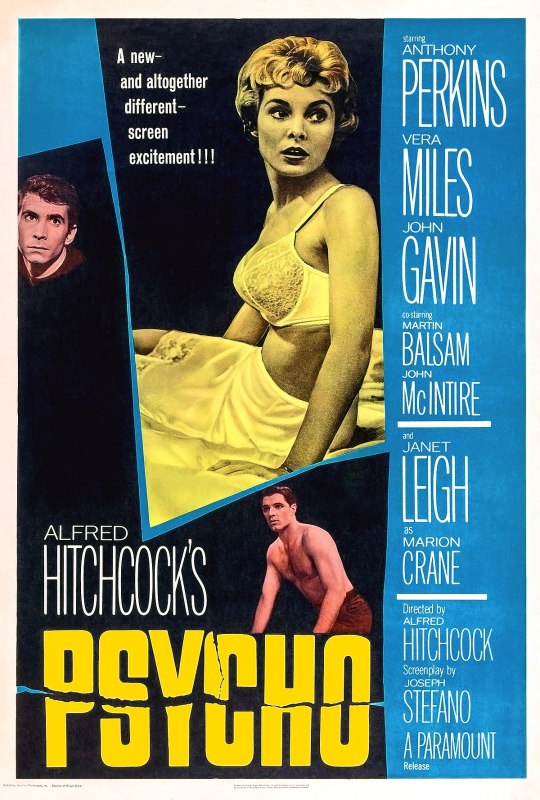
Psycho (1960)
Watched: 10/26/2023
Format: Peacock
Viewing: 3rd or 4th
Director: Alfred Hitchcock
So, it's not really worth talking too deeply about Psycho (1960) here at Ye Olde Film Watch Journal. The movie is one of the most written about, discussed and analyzed flicks that one is likely to see. So I won't get into plot, analysis, etc... Y'all can chase that around on your own.
I hadn't personally seen it in probably two decades, so I decided to give it a whirl as part of our Halloween spooktacular cinema series.
Probably my foremost comment is that the movie actually lives up to the hype. Some movies do. Lawrence of Arabia. 2001. The Godfather Part II. I can go on listing great movies, but just assume I agree with you as you fill in your own blank here.
Maybe those movies show signs of age or that they were made in another time, but there's nothing about them that doesn't pull you in and hold you. And Psycho - minus the weirdo psychoanalysis at the conclusion - is kind of a perfect film. Every line has weight or double meaning, every shot provides you with information about the story and characters, and the sound and atmosphere are on point.
Hitchcock is known as the master of suspense, and from the moment Janet Leigh picks up the money, the movie never really lets up. That it breaks deeply ingrained narrative tradition and bumps her off - now one of the most famous scenes in cinema - is still a mental jolt. You're all in on Marion's flight and plight by the time she decides to get clean (itself a double meaning).
I can only imagine how audiences felt in 1960. You'll hear it pitched as the first 30 minutes - but the car sinks at about the 1 hour mark of a 110 minute film. To actually have a victim built up as a protagonist, it just naturally seems she should survive - something that Leigh's own daughter would perfect in Halloween. And the beautiful leads almost always survive in horror pictures - drop a comment to name a movie where one doesn't, prior to 1960.
It's also impossible to say enough about Anthony Perkins in the movie, who possibly did *too* good of a job and got himself planted in the world's consciousness as Norman Bates, no matter what other roles he took on. But, man, not a false note in the film, and putting in a performance utterly ahead of its time. This role is closer, timelinewise to Dracula by 30+ years than it is to today, 63 years on. Absolutely unreal. And if you were only partially there with Norman, the final moments of the film are one of the great selling points.
I've seen and enjoyed the direct sequel - but I'm not sure it ever should have had one. That final shot should have been the end capper.
I'm not clear on the production of the film. I know the studios didn't want to make it, and it seems like a good 1/3rd of movies that go on to be genre-busting classics come for very passionate filmmakers studio execs want to out guess. I know you wind up with some duds from letting name directors chase their bliss, but sometimes you wind up making one of the most important films of the century.
Psycho has its sequels, a TV show and it's been endlessly referenced, ripped-off, homaged, and a good chunk of films are now a xerox of a xerox of the original. And for good reason. A lot of horror would learn its tricks from the movie and how its framed, how Hitch used the stairs and sets and camera placement. Montage would tell us more than actually just showing the thing in the shower sequence. Reveals that show us things are endlessly more f'd up than we first expected when we find Mother in the cellar.
I don't know that simply dipping back into the well is able to recapture what's there. It's the Hitchcockian synergy of all the elements working together, and that's lightning in a bottle. That some can do this over and over is just amazing fortune for audiences.
If you listened to our Texas Chainsaw Massacre podcast, you'll be aware that I recently finally Googled the murders of real life psychopath Ed Gein, which partially inspired TCM, Psycho and portions of Silence of the Lambs. There's a whole lot to unpack there, and it's absolutely horrible, but turns out the author of the original book that Psycho is based on lived near Gein, so you can see how he'd have some inspiration.
I don't really have much to say on it, and I don't particularly think you'll sleep better actually reading up on Gein, so don't. But it's also fascinating that one guy seems to have spread his personal horrors out through so much culture and pop culture.
0 notes
Text
The Truth About Your Heart P2
P1/P2
Part two here we go! I had most of this written out when I put part one out, but thought it needed just a little more before posting it, so it got saved to drafts where I thought I'd work on it later, and then i had to get ready for a trip to visit my parents and my SIL's chiropractor F'd up her back and I had a frightening couple of days where i thought i might've had a malicious cyst and well...
It's later now I guess...
Anyways~ To Part TWO!!
Chapter Two.
King was face to face with Ban, and he hadn’t seen the Fox Sin of Greed this pissed since fighting the literal king of demons, even then it was never aimed anywhere near King so having it happen now was unsettling to say the least.
“Why King? Why the fuck is Captain asking for the kids to join us? He’s never asked before.” He started to pace around the room, picking up bags and various items while talking, ���This has something to do with that prophecy the old man spat out doesn’t it? It already involves one of my kids, is he trying to drag one of the other two into it?”
“Ban.” King grabbed his brother-in-law's arm to turn him to look at him, “Calm down, lest you forget that you’re not the only person with a child of prophecy.” King took a breath before continuing, “And you said yourself, this might not be anything more than the Captain being bored and wanting to see us. I know you’re worried but accusing the Captain of foul play when he has no control over it won’t help anyone.”
Ban looked back at his old friend, his brother now, and closed his eyes, slumping into a chair and placing his face into his hands.
“I know,” He spoke softly, “I know it won’t, but I can’t do this King. I can’t live with this fear of my kids being sucked into a fucking apocalypse, I don’t know whether I want to be dead before we figure them all out or just know and have it be over with.”
King nodded solemnly, when Bartra invited all the sins to meet, they never expected to be given a vision of those Four Knights, who would either stop the apocalypse, or be its cause.
When Gowther used his magic to share what exactly Bartra was seeing. That was his first mistake.
King saw Meliodas fall, just for a moment, as if the shock had taken away all his strength. King would’ve fallen too if he saw his own son in that vision.
Seeing Tristan, an adult Tristan, shocked all of them to say the least, King could only imagine what was going through his Captain's mind. And either Meliodas had purposely shut King out or his mind simply went blank from fear, but King couldn’t read his heart. All he could feel was bone deep fear emanating from his once fearless Captain.
He was just glad that Elizabeth hadn’t been with them, he didn't think he would’ve been able to stand hearing her heart, which had always been a painfully open book.
Tristan was the Third of the children of the Seven Deadly Sins, with King's own son being born right after his and Diane’s wedding, and King's nephew (Lancelot, the poor lost boy, his first nephew, who he was afraid might’ve been his last) beating Tristan by just one month.
King was close with all of the children, he never expected to have such a natural talent for child rearing but he was glad he did, whenever the girls would need a day off and the boys would take the kids, Mel and Ban would always be rushing to King for advice, which was new.
‘How do I heat the milk up? How hot does it need to be? What if I burn him!?’
“Just warm it up a little, it doesn’t need to be hot, it just needs to not be cold.”
‘I’ve tried bouncing him and feeding him and changing him but he’s still crying! Does he hate me!? What do I do!?’
“He doesn’t hate you Ban, he just needs his chewie, he’s teething and his teeth probably hurt a little.”
‘King, what's a Binkie? Eli left me a note saying Tristan needed it for sleep but I don’t know what it is!’
“Probably a blanket, didn’t he used to drag around that old purple one Lady Veronica made for him everywhere? It’s most likely that one.”
‘King I will pay you whatever you want if you’ll give them pillow rides.. Please, that's all he wants to do and he says he won’t breathe until he can.’
King was proud to be the one who knew what he was doing while the others were standing around clueless for once in his life. So he never complained whenever he would be given the kids to watch, he loved being with them, Lance was the calmest child he had ever met and would spend most of his time following around King’s children to ask them to play, and Tristan was just in awe of most things King did, and would ask him to tell him stories while sitting on Chastiefol.
King adored Tristan for who he was and what he represented, Peace. Finally after 3000 years, a child of Meliodas and Elizabeth was born, they had waited so long for a child but never risked it before their curses were broken.
Seeing Tristan in that vision, with cold eyes and a war-torn look on his face, covered in heavy armor and riding upon a white horse shocked them all to their very core. They had never thought their kids would be dragged into war, not after all they had done to stop the last one, they had worked so hard for peace.
They knew something was wrong, after what happened to Lancelot they were all on guard, but they thought after they found him it would be done.
‘Five years isn’t that long’ they all had thought, ‘Surely after we find him and fix this we can all go back to living peacefully.’
Seeing Tristan had painfully reminded them all that while five years isn’t that long for them, five years was a third of their children’s lives. They’ve barely lived a decade and are already being thrown into war.
Yes, they were all distraught by seeing the young prince as the Knight in that vision but nothing could’ve prepared them for the knight that came next.
Ban hadn’t said anything when he saw the adult Lancelot standing there, he hadn’t said anything or moved at all, looking back, King realized that was probably due to the fact that he couldn’t breath.
To have not seen his first born for so long and then seeing him grown up in a prophetic vision warning them of the apocalypse? That must’ve hit hard, it apparently hit Gowther hard enough to have him make his second mistake, accidentally knocking them all unconscious.
It was dawn when they had gathered and midnight when they all awoke.
Gowther apologized profusely and tried to get the rest of the vision, but Batra’s mind was old, and his memory was shaky at best. He remembered that the other two knights would have Golden Magic, and Verdant, Wing-like hair.
The knight with the hair would be rather easy to spot, so they all quickly gathered that he must be out in the world somewhere, and wasn’t any of their children.
But the knight with Golden Magic could still be one of theirs.
King knew that Ban would be upset by the summoning, but he still wasn’t prepared for the rage and fear he felt from his brother-in-law's heart.
“I’m gonna go make sure everyone’s ready, calm your heart before coming out please? Everything will be fine, and I don’t want Deidrick or Ellie to pick up on anything.”
“Yeah yeah, I got it. Just go, I'll be out in a bit.”
As King left he spared one last look to the Fox Sin before leaving.
Ban was now left with nothing but his thoughts. And that was never fun. For anyone but especially not him.
This prophecy business was irking him, that fact that three knights were unaccounted for was problematic, the fact that they only knew who two of them even were wasn’t great either, and the fact that they only had one defining trait for each of the unknown two was fucking irritating.
They could literally be anywhere and anyone. The green hair wasn’t that bad because they could be easily identified. But the Golden Magic? Any child that hadn’t yet developed magic became a candidate. And since a large amount of the children he knew were still young, it was concerning, to say the least.
Ban was particularly concerned as neither of his youngest children had developed any innate magical abilities yet.
His daughter could float slightly and was growing healthily, Elaine’s best guess was that would likely inherit her magic, so he was less concerned about her.
But his second son, Gustav. That child worried Ban.
Gustav hadn’t displayed any magical abilities at all, and when Ban had asked around, none of his friends or acquaintances had sensed any innate magical ability within the boy.
Ban should feel relieved, but he wasn’t.
Despite most people believing that Ban was “A brute who couldn’t appreciate a good book if he was beaten to death with it, in fact they weren’t sure he could read at all”, (These were Gowther’s words to Ban after The Fox Sin had spilled Ale on Gowther’s Brand new Book, ‘A Week Spent With Fredrick’. Ban had apologized but Gowther was still bitter for about a month afterwards) Ban read quite a bit.
He had read about heroes who were a part of prophecies, and “The child without magic suddenly gains powerful magic and becomes a tragic hero” was a frighteningly common troupe.
So every day his son walked around with no magic, Ban would pray the child stayed that way.
The fact that the hero in the stories would always be from a long line of heroes or had some sort of tragic backstory, that only made Ban worry that much more, because he had adopted Gustav when the boy was seven.
And seven years is a lot of time unaccounted for.
Lancelot had been missing for two years when Ban made that journey to the edge of Benwick. It was a cold rainy night, in the middle of December. Elaine was waiting at home, heavily pregnant with their second child, and he had been extra paranoid since she was so close to her due date, and the rainstorms had started.
They had been tracking the weather like madmen ever since Lance and Jericho had disappeared that night, at this point Ban could feel the storm's arrival in his bones.
Even so, Ban couldn’t take any chances, so he was determined to do one quick check before heading back to his wife.
He was just about done when he heard it, a small cry of a child, how he had managed to hear it, let alone realize what it was through the tumultuous rain he didn’t know. But he hoped upon hope that maybe that cry belonged to Lance, that after two years his son had finally returned.
He dashed across the field to the middle of the valley in front of Benwick, calling out for someone to hear, he could barely see through the rain, he was soaked from head to toe.
He searched and listened but could hear nothing, see nothing.
He was almost convinced he had some sort of auditory hallucination when he heard it again, louder this time.
He pinpointed the sound coming from the stone near to where he and Jericho had last talked about the disappearances.
As he made his way there his hopes soared, finally, maybe he had found him. His son, his Lancelot.
His hopes were dashed almost as quickly as they had built. As he was ten feet away, there was a child there, behind the stone, but this child was just that, a child.
Lance would’ve been thirteen by now, and much larger.
As his hopes faded away into a despairing thought that he may never see his child again, his thoughts quickly turned to panic when he got closer and saw the child there, soaked worse then even Ban was, and the worst of it was the child wasn’t shivering.
Now Ban’s not the smartest but he knows that being that wet and cold your body should be moving trying to warm you up, that’s what the shivering was, the fact that the child wasn’t moving was more than concerning.
Ban began to walk to the child, ‘He has to be alive,’ Thought Ban as he approached, ‘He had called out to me, and I came here so fast, he couldn’t have died that quick.’
He put his hand on the kid's shoulder, slowly so as to not frighten him. The shoulder was as cold as he expected, when he turned the child’s body towards him, he nearly had a heart attack at what he saw.
Sunken in cheeks, and his frame was slim, too slim for a child, he had pale skin that stood out, even in the dead of night, Ban couldn’t even tell if the poor child was breathing or not.
Throwing caution to wind, he picked up the kid into his arms and removed the ripped, faded, useless, blue shirt to put his ear to the boy’s chest.
He had seen something like this before, a child that was cold, slim, and pale, (His sister had looked like this before she died) and he knew that no child could’ve survived a night like this all by themselves.
He knew that most likely what he heard was either the poor child's last hurrah, or the wind playing tricks on his mind. but still he hugged the cold child closer to his ear, hoping against all he knew.
‘Let me be wrong,’ He prayed, ‘Just this once, please let me be wrong.’
And for the first time in his life, it seemed God was on his side, for he heard it, the soft ‘bump-bump-bump’.
It came from the boy’s chest, and Ban swore he had never heard a sweeter sound in his life. He took off his jacket and wrapped it around the boy before taking off into the night, making a beeline for his home.
That night had been one of the most frightening, heartstopping, painstakingly slow nights of his life. He had brought the child home in a panic, holding him as close as physically possible, trying to warm him up.
Bursting into his home he had called out for Elaine, when she saw what he was carrying she immediately got to work, drawing a warm bath and breaking the emergency spell bead that had originally gotten as a way to summon Elizabeth to help with the birth.
To say Elizabeth was confused was an understatement, seeing as Elaine was still two months away from her due date. But she had quickly gathered what was going on and had chased Elaine and Ban from the washroom to focus on the poor boy.
Elaine and Ban had waited the whole night in the living room, waiting.
Elaine had fallen asleep two hours in, but Ban didn’t sleep that night, couldn’t sleep, not until he knew the boy would make it.
At midnight Elizabeth had come back down to them, looking as exhausted as Ban felt, and had told him that she had done all she could, and that the rest would be up to the boy.
She had offered to take Elaine to lay down while he watched over the boy, he had thanked her profusely for that.
He walked into the room with deep fear in his heart, as he saw the child lying there he had two conflicting emotions trying to settle within him.
One was a bleeding worry.
The child looked two steps from death’s door. Their breathing was erratic and heavy, interrupted with horrid coughs, their face was flushed a bright red, and he swore he could see tears leaking from the squeezed shut eyes. He was adrift with concern that the child might not make it through the night. He couldn’t take it, this child had barely lived. How old were they? They looked to be about five, but they were so thin, were they that small or starving? He didn’t know their age, he didn’t even know their name, he didn’t want to carve out a blank gravestone Goddamnit.
The second emotion was a deep, warm, fondness.
He looked at this child, so small, and saw his tiny eyebrows furrowed in anger, as if they were fighting against their sickness with all their tiny might. He looked at their small hands, clutching the blankets so tight they turned red, so small and so strong. He pushed back their bangs that were sticking to their head with sweat, he briefly wondered what color his hair would be when they got it cleaned? He had known this child for less then a day but he knew that he would protect him with his dying breath.
He had picked up a storybook Gowther had gifted him for Lance, deciding to read to the boy. As he read the book he could hear the boys breathing starting to settle into even breaths, no longer wracked with coughing.
When he finished the seventh story, a tale of two parents and their baby being saved by a ghostly warrior, the sun had begun to rise out the window, shining onto the small boy. That was when he heard it.
“P-please…” The child had spoken, Ban had barely heard it.
He got closer to the child, brushing his hair back and asking what he needed, water? Food? Was he cold?
The boy had furrowed his brows as he struggled to respond, but had managed to utter softly,
“Please… turn the stupid sun off… it’s hurting my eyes.”
Ban had never cried so happily in years.
The boy had taken months to fully recover, (He still had breathing problems to this day) but had been quickly inducted into Ban’s family. He couldn’t remember who he was, or where he came from. The last thing he remembered was walking through the rain looking for shelter, and calling out for help before collapsing, he didn’t know how far he had walked. He couldn’t remember what his name was either, so Ban and Elaine had decided to just call him their Boyo, just in case he remembered.
When Beru was born the boy had been quick to help wherever he could, making sure Elaine could rest comfortably and cleaning up around the house so it was easier. Elaine still recounts how helpful he had been to this day.
There was this moment, about four months after Beru had been born, when she was trying to roll onto her stomach while lying down on the bed, and she had somehow managed to wiggle her way out of her blanket pile and scoot near the edge of the bed without attracting Ban or Elaine’s notice, but she hadn’t escaped the boy’s.
She had nearly rolled herself off the bed but the boy had flung himself towards her and had caught her at the last moment, Elaine and Ban had rushed to the both of them to find their Boyo red faced, chastising the small baby about how she should’ve stayed in her blanket pile and had no reason to throw herself off the bed.
Beru just giggled, having no idea what the boy was saying but seemingly amused by him all the same. The boy wasn’t as amused but still carried her to Elaine, Beru still overcome with giggles.
Watching the scene, Ban had been reminded of something, a long memory buried deep back in his mind, of the only time he had ever seen Jericho’s older brother talk to her.
He had gone to check on her, mostly because he was told by Merlin to double check that he had actually fully removed the demon seed from her, but partly because he had felt slightly guilty for unintentionally driving her to become a demon host by purposely humiliating her at the prison, but you’d never hear him admit that outloud.
When he had finally found her, she was already in a heated discussion with someone else, her older brother.
He was apparently chastising her for ‘running herself ragged’ to which she countered with ‘walking down the street to get something to eat wasn’t running herself ragged, she was just bored for God’s sake!’ to which he then responded with ‘It’s running yourself ragged when we literally have people we pay to do that so you can rest you incorrigible dumbass! You had a DEMON residing in your body feasting on your emotions for months! AND YOU CAN’T REST FOR A WEEK!?’
His entire face had gone bright red with anger at his sister’s nonchalance for her own health, which she had apparently found hilarious because she had started laughing hysterically.
Her brother wasn’t as amused but he helped her back to her feet and they started the other way, Jericho laughing the whole way.
Ban stared at the children in front of him as he was reminded of that day, the only clear memory he had of his foster sister and her real brother, and remembered his name.
“Gustav.”
“Yeah Dad?” The boy had responded.
That one response had shocked both of the boys in the room into silence, the only thing anyone could hear was Beru, still giggling.
After trying to coax the boy out from under the bed, where he had hid in embarrassment, Ban had decided to talk with him about how he would adore if the boy wanted to call him Dad, and had asked why he had responded to the name.
“It felt right? I don’t know, you said it and it sounded like you were talking to me, sorry.”
“Kid, you don’t have to apologize, you didn’t do anything wrong.” Ban was lying down next to the bed on the floor on his back, talking to the child as he rested his small chin on his crossed arms.
“Does someone else already have it?” The child questioned.
“Have what?”
“The name, you said it. Does someone else have it or did you make it up? Like you did with Master Hawk?”
Ban fixed the boy with a slightly annoyed look, “Number one, Master Hawk is very real-” The boy fixed him with an equally annoyed look and scoffed slightly, “AND, no. I didn’t make it up, he was my-” He cut himself off there, were he and Gustav anything?
Jericho was Ban’s sister, and he was her Brother, you could pry that title from his cold dead hands, but he and Gustav were never close, had they ever even spoken to each other? Or was Ban just a stranger that had known Gustav’s sister and attened his funeral?
“He was your what?” The boy had scooted slightly out from under the bed, enough to lay his upper body on Ban’s chest to look him in the eye. And as Ban looked at the boy, he decided that he had already claimed Jericho, he was sure Gustav wouldn't mind if Ban decided to claim him too.
“He was my little brother, his name was Gustav, and he was an annoying older brother, seeing you nag Beru reminded me of him.”
The boy puffed his cheeks out in anger, “I wasn’t nagging!”He said fervently, ”She needed to know she can’t just roll herself off of places like that! She could get hurt!”
“She’s like three months old.”
“If you treat her like a baby she’ll never grow up! You gotta talk grown up like and then she’ll copy you! And besides, I know she knows better, you can tell from her eyes.”
“See? Naggy~♪”
The boy had then smacked Ban on the head before fully laying down on top of him.
“If he’s your younger brother, how could he nag like an older brother?”
“... He didn’t nag me, just our younge-” He choked up a bit at this point, he hadn’t really talked about Jericho since she and Lance had disappeared, he cleared his throat before continuing, “Our younger sister, Jericho…”
“Oh… D-do… Do you think he’d be… Okay with it?”
“Okay with what?”
The boy had curled up into the crook of Ban’s arm, he did that often, whenever he was unsure of things and needed comfort.
“With me using his name? Will it get confusing? Would he be mad?”
“No buddy, I think he’d like it. I think he’d like it a lot.”
“Okay… Then I’ll use it good, so he’s happy, I’ll grow up big and strong, so his name gets a good story.”
Ban broke into a wide grin at that, “Sounds like a great idea~♪, Super smart like.”
“Thanks… Dad.”
Ban was glad the boy had curled himself into his arm, he didn’t like letting kids see him cry.
“No problem… Gustav.”
#nanatsu no taizai#seven deadly sins#four knights of the apocalypse#4kota#elaine nnt#nnt ban#nnt King#nnt hawk#nnt harlequin#Harlequin#nnt jericho#nnt elizabeth#Ban#Jericho#Elizabeth#Deidrick#Elli#Oc's galore!#Lancelot 4kota#lancelot#once again#really wish someone else could write this#because I would love to read it#and I love writing it!#It's just that I was supposed to be in bed like four hours ago#Beru#fanfic#the four knights of the apocalypse#rip to my fucking eyes#god im tired
10 notes
·
View notes
Note
Whoever said we f'd up isn't paying attention. We worked our asses off to stop the Burning Crusade, and we should be relieved that Sargeras is imprisoned. So no, we did not F up.
Wellll…. There’s a couple ways to look at this. Yes, we succeeded in defeating our most ancient and threatening enemy. But if the “enemy of my enemy is my friend” adage is true here (which is disputable), we got rid of a potential ally in the fight against the Void… which is more or less the point of the post you’re referring to. We still have the Void to contend with, especially since its influence in the physical universe is getting stronger and stronger. Even the comic with Anduin showed that a confrontation is inevitable some years in the future.
The player characters are immensely powerful. We’ve essentially reached “peak” by defeating WoW’s most classic villain, Sargeras, even if we weren’t the ones to battle him directly. Point is, we’ve finally met our creators and defeated a Titan (or two). The question is: are we powerful enough alone to defeat some evil creatures that are essentially natural universal forces that can’t really be destroyed? Sargeras was building up the Burning Legion to destroy the universe so the Void couldn’t corrupt everything… but we, the army of PCs and NPCs aren’t trying to destroy the universe so much as stop the Void Lords, whatever that means. That puts us in a much tougher position because destroying the universe was pretty easy for Sargeras… in fact, it was the only solution he saw because I don’t think he believed he could stop the encroaching Void Lords.
I think it’s kind of a lose-lose situation. Sargeras destroying the universe, as bad as that would’ve been for all living races, would have effectively stopped the Void Lords until another universe was created (hence the “we screwed up”). Now that we’ve defeated him, we have to spend the rest of existence trying to keep the Void Lords from corrupting this reality, which probably isn’t that much different than being destroyed by Sargeras. It’ll just take a lot longer and be a lot rougher for a lot more people as opposed to being immediately wiped out by Sargeras, who believed he was performing an act of mercy.
Did we really screw up? I don’t think any outcome involving Sargeras would’ve worked in our favor. He might have been able to defeat the Void, but then where would we be? I don’t think Sargeras would’ve ever worked with us, although that’s not to say he still can’t some time in the future. If “defeating the void” in an ‘ends justify the means’ kind of way is the question, then yes, we did screw up by imprisoning the person who was trying to do just that thing. If “defeating the void” by saving the most lives possible is the question then…. we have yet to tell, because we could honestly still be wiped out by the Void, which would still mean “we screwed up.” It’s probably going to be a long time before we find out.
Someone in a discord I was in brought up a good point about how the Legion existed before and will probably exist after Sargeras. It’d be interesting to see us going a direction where demons ally with us to help fight against the Void (which, y’know, is kind of already happening with the Illidari, Shivarra, warlocks, etc.) Not to mention, we also have void elves, which are basically the void version of demon hunters right now.
9 notes
·
View notes
Text
Okay, let's go over the rest of that post!


I mean, I am one, so... yeah!

I would love Film Theory to cover this! 😁
Also, when I first read "disapper" in Red's screenshot, I read it correctly. Then I scrolled down to the comments and saw this.

Afterwords, I CTRL+F'd my page to see if I had made that typo somewhere.
Needless to say, I'm so glad the typo was Red's this time and not mine. 😜

Do they, or do they just appear to because Bea is seeing them through visual hallucinations, as kids typically experience imaginary friends. And how some with DID see alters.

🤣
I don't have anything to add here. I just love the doodle! It's pretty accurate to this one, since IF took me in so many different directions with all the different interpretations of plurality to explore!

No.
There are many recorded instances of possessing entities across different cultures, and headmate is a catch-all term originating from non-disordered/non-traumagenic plurals that encompasses any entities sharing a body, whether spiritual or psychological.

Wrong again, Red!
Even a cringizen was on this.

Thanks u/Celestial_Ari! Glad to have you on my side! 😁
I could cite plenty of case studies of adolescents with DID if you'd like, but they're so easy to find that it doesn't even feel worth my time.

Nope!
You're misunderstanding what is meant by "better explained."
Essentially, a psychologist has to rule out the possibility that the child is just experiencing normal and healthy imaginary friends that are common in children of this age.
Bea's memory loss and blackouts though aren't explained through "fantasy play" alone. And she's definitely not pretending to forget.

Bea blacks out outside and wakes up somewhere else with the implication that the IFs physically moved her.
Later in the movie, she enters a locked amusement park she should have no way of getting into after Cal claims to be going around to get the key, and she believes she was in the amusement park the whole time. She visits this place a couple times despite the fact that she had no way to physically get in there. The same goes with Cal's apartment. We don't really know what's happening with Bea's body whenever she "visits" these place she can't physically get to.
Bea forgets Cal completely even when he's right there in front of her, and this is an IF who she drew pictures of and was closely attached to when she was little. Sure, memories can fade, but the extent to which she forgot Cal is too much of a reach to just be a natural part of development.
Moreover, if we assume a psychological explanation for the IFs, then Cal has to have memories that Bea doesn't for this plot to work. Meaning, in other words, that Cal and Bea have dissociative barriers between them.
Related to this, another cringizen asked this...

And the answer is no. 🤷♀️
Because nothing is ever JUST an imaginary friend. Depending on your beliefs, an imaginary friend can be a spiritual thoughtform brought to life by imagination, it can be a completely autonomous self-conscious psychological construct like a tulpa (ME!!!!) or it can have no sentience and is just an imaginary puppet that does whatever its creator dictates. Sometimes an imaginary friend in media isn't even created by the child, and is an actual external spirit that's bonded with them somehow.
In pathological cases, an imaginary friend can be an alter or a psychotic hallucination.
In the end, all an imaginary friend really is, is some type of entity a child can see and nobody else can. But the label itself says nothing about the imaginary friend or how it functions or what it really is.

It isn't all about Hazbin Hotel either Grace, but didn't stop you from deciding literally every religious alter came into existence because of that show.
And no, I will not ever let you live that down. 🤪

This was funny!
No further comment! 🤪

I'm just full of surprises, aren't I?
I wouldn't say Inside Out is ableist exactly, to be fair. Just that it pushes a narrative that is rooted in ableism.
Just like I wouldn't say every piece of media that happens to portray robots with autistic or otherwise neurodivergent traits to showcase their inhumanity is ableist. These are more biproducts of an ableist culture.
Society decided a list of traits robots had, they sunk into pop culture, and now everyone just goes with it without even thinking about why those specific traits are what defines a machine, and why others are what defines a human.
Likewise, "adults can't have imaginary friends" comes from this ideology that sees people who hear voices or experience other sorts of hallucinations or pseudo-hallucinations as dangerous or otherwise strange for their experiences.
Even helpful voices are seen as bad and something that needs to be fixed.

Isn't it?
Inside Out was a movie all about psychological symbolism.
You don't think that the writers, when arranging a situation where the only way for Riley's Joy to survive was for her imaginary friend to die, were saying anything with that?

I just don't get this interpretation.
To me, the messaging seems pretty clear. If Bing Bong hadn't sacrificed himself, Riley never would have grown and matured. Bing Bong had to die to save Joy. He had to die so that Riley could survive. Whatever Bing Bong once helped Riley with, his purpose is fulfilled and his death is the only way Riley can move on.
I can't see another way to interpret that symbolism.
The Plurality of... IF
Major spoilers for IF and Inside Out ahead. You have been warned.
Enter a world of IFs
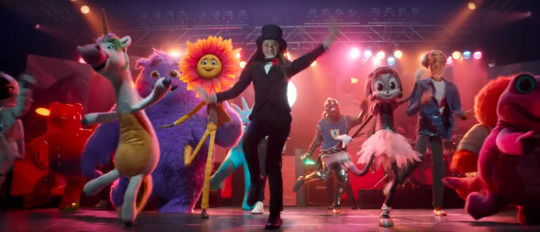
IF is a movie about a young girl named Bea who lost her mom, and whose dad is going in for a life-threatening surgery. At the start of the movie, Bea has outgrown imaginary friends, and perhaps imagination in general.
Which makes it really inconvenient when she starts seeing other people's imaginary friends, which call themselves IFs, and finds a whole community of abandoned IFs whose children have outgrown them.
These IFs are desperate for attention and have been looking for new kids to connect with. Bea agrees to help them, and tries introducing them to a kid she knows.
When this doesn't work though, they realize that connecting the IFs to new kids may just be impossible. They instead decide they need to connect the IFs to their original children, even if said children are grown now.
A cool and unexpected theme to the movie is that you never fully outgrow your need for imaginary friends.
The rest of the movie is Bea trying to rekindle the connections of the IFs to their now-grown children by jogging their memories of the past.
The Plurality of IFs
Plurality: A state of multiple self-conscious agents, or "headmates," sharing a single body.
One thing about the movie is that a whole lot about how plural it is depends on you interpret the IFs. Are they separate entities entirely who were created by their children? Or are they connected directly to the minds and bodies of the their hosts? Are they even other children's imaginary friends as they claim, or are they just in Bea's head?
For what on the surface feels simple, the movie leaves a lot, pardon the pun, to the imagination.
What we know for certain is that each IF is self-conscious. And they are, according to the poster on the right of the billboard below, real.
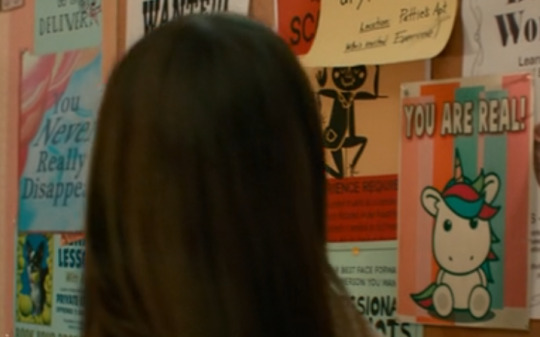
They also at least appear connected to the host's body.
We know that, with the exception of Bea and other IFs, only their creators can see or interact with them.
It's also likely that when their host dies, they do too. Which yes, makes the poster on the left saying "you never really disappear" a bit misleading. But in the movie, we never see IFs of people who have passed. It's all just IFs whose children have outgrown them.
For example, while Bea finds the IFs of her grandma and her dad, she never meets her mom's IF.
With this in mind, I think regardless of the interpretation, there's undoubtedly some sort of plurality going on here.
To explore these different scenarios, we need to start asking the central question of the movie.
What if?
What if… the IFs are actually physical?
In the movie, we see multiple times that IFs interact with the physical world. They open doors. They pick things up. They move things around.
There's one scene in the movie where Blue, the big purple IF, hid in the clothes in a laundry cart in the hospital.
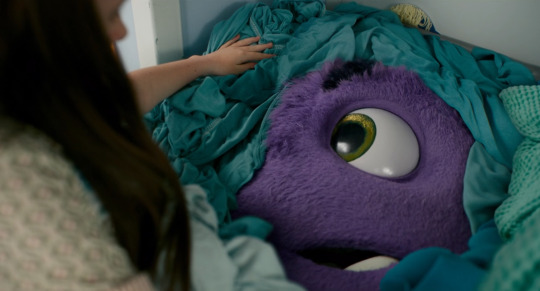
As Bea tries to pull him out, the cart physically rolls around the room.
There's also another scene where Bea faints after seeing an IF, and it's implied the IFs physically moved her inside.
If we're to interpret the IFs as being physical and everything we see in the movie as being completely real and to be taken at face value, this has some pretty huge implications for this universe. And Bea's story in a world of invisible creatures created by children who can physically interact with reality might be the least interesting story in this universe.
After all, if the IFs can do things like this, surely other people have noticed. One can imagine the CIA training children in a secret bunker somewhere to use their IFs in combat. Secret weapons that are invisible, can spy on anyone, can move objects around in the physical world, and can only be killed by finding and eliminating the host child.
It's a pretty awesome if terrifying thought.
IFs would be the ultimate spies and assassins.
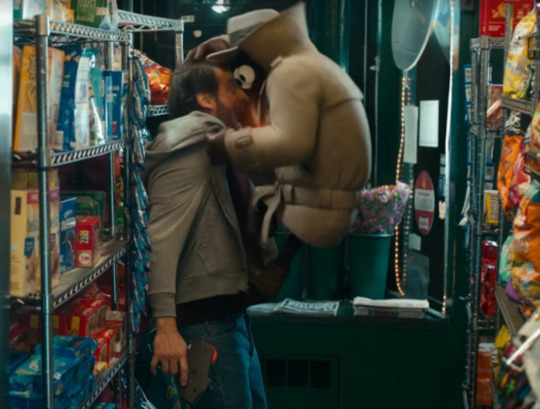
But this also creates another issue. If the IFs are actually physical and can pick things up, why not just pick up a pen and let their host children know that they're still there. Why not type on a keyboard?
And it's for this reason that... I just don't think the movie wants us to believe the way the IFs are physically interacting with the world is actually happening.
Okay, but if they're not physical...
What if… the IFs are spiritual headmates?
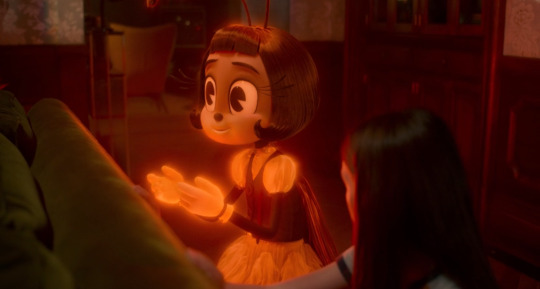
This seems more reasonable. And while not the one I think is the most likely, this IS the explanation that I like the best. It's the most thematically satisfying.
In this, the IFs are spiritual thoughtforms created by the children. Because they're spiritual, it makes sense that somebody who has a special gift, as Bea does, can see them. And that they can see each other as well.
At the end of the movie, we get to see all these adults connecting with and being able to see their IFs again, and it's a really cool and satisfying way to end the film, seeing their work pay off and giving a happy ending to the story of all the characters we got to know over the course of the film.
I love that ending. I love seeing the heartwarming reunions of the IFs and their hosts after all of those years.
I just don't believe it... I want to believe... but I don't...
Which leads me to my final interpretation... That all of this is happening entirely in Bea's head.
What if… Bea has DID?
Wait, I know what you're thinking, why DID specifically? You don't need DID to be plural, after all.
I'm personally a tulpa, an imaginary friend of sorts given life. And I would naturally love a purely endogenic explanation. But as with the spiritual explanation, simply wanting something to be true doesn't make it so.
First, let's talk for a moment about DID's criteria in the most recent edition of the DSM, the DSM-5-TR

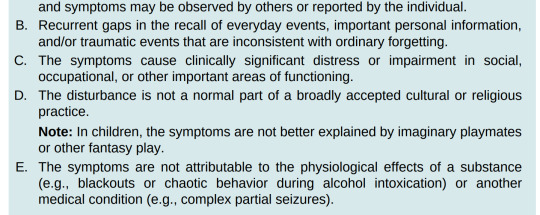
These are the boxes a clinician would need to check for a diagnosis. (Note: Simply checking the boxes isn't enough to diagnose. There are additional features that need considered. These are just a minimum. Basically, if you don't check the boxes, you can't have DID under the DSM.)
The big ones are criterion A and criterion B. The other three criteria are all exceptions, saying what DID isn't rather than what it is.
Criterion A
Later in the DSM, it's explained that the criterion A phenomena often presents as "independently acting imaginary companions."

To be clear, not all independent imaginary companions are indicative of dissociative identity disorder. That's the point of criterion C.
And studies have shown that as many as 29% of imaginary friends demonstrate consistent behavior indicative of acting outside of the host child's control, while another 35% appear mostly compliant but don't always do what the host child wants.
The participants were 89 preschool children who described their imaginary companions (46 invisible friends and 43 personified objects). The descriptions were coded for disobedient or otherwise difficult behaviour attributed to the imaginary companions. Thirty-six per cent of the children described their imaginary companions as consistently compliant and agreeable, 35 per cent gave some indication that the imaginary companions did not always do or say what the children wanted, although they were mostly friendly and compliant, and 29 per cent described their imaginary companions as noncompliant in ways that suggested the children experienced the companion to some extent as being out of their conscious control.
About two thirds of imaginary friends then demonstrate some level of independence from the host child. That doesn't mean DID on its own.
However...
Criterion B
Remember what I mentioned earlier about how Bea sees an IF and passes out, and it's implied that the IFs physically move her body to a new location?
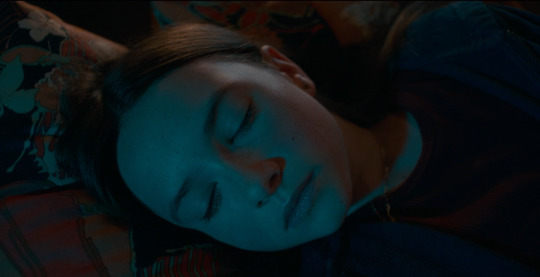
This is something that stuck with me since the first viewing. I already went over why I don't believe the IFs are physical. But then, how does Bea pass out in one place and then wake up in another completely different place?
The easy solution to the conundrum is if they switched. That Bea experienced a complete blackout switch while someone else controlled her body. She doesn't know how she got there because of dissociative amnesia.
This dissociative amnesia fulfills the second criterion.
But it's even more than that.
HUGE MEGA SPOILER
Bea is accompanied through her journey by Cal. While Cal is originally presented as a human neighbor, he's later revealed to be Bea's former imaginary friend, who she forgot about. The entire time they interact, she has no memory of who Cal is or her adventures with him, despite Cal remembering and the other IFs being aware of Cal's connection to Bea.
The Other Criteria
Criterion C is a bit of a doozy. What constitutes "clinically significant" is up to the individual clinicians. But generally, experiencing random blackouts is probably going to be impairing.
(Ritual possession states also cause dissociative amnesia, but it's generally more controlled unlike Bea's episodes of memory loss.)
For criterion D, I would say the amnesia above couldn't be explained simply by imaginary playmates alone, even if her headmates are presenting as imaginary friends.
And for Criterion E, there is no substance abuse nor other medical conditions that we know of.
Trauma history
Trauma is not part of the diagnostic criteria, but chronic trauma does occur in upwards of 90% of DID cases.
In the opening, we see Bea's mother going in and out of the hospital.
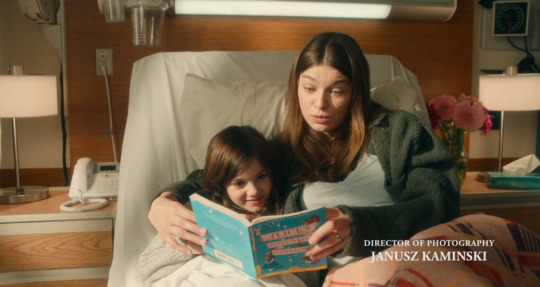
Now, typically, the type of trauma that is associated with DID is some sort of neglect or abuse. And we don't see that in the flashbacks. But maybe we're just seeing the positive memories in what's meant to be a kid's movie. Maybe we're not seeing the times Bea is worried sick over her mother. The times her parents aren't there for her because there's more focus on her mom's condition. The times her dad couldn't be emotionally present because he was mourning the loss of his wife.
Could this be enough to cause DID? I genuinely have no idea. But since people process trauma in different ways, I think it could be traumatic enough for Bea.
And if this was tied to trauma from her mom, this explains too why this starts up only after Bea's father is in the hospital, bringing back that trauma she had from losing her mom.
In this scenario, all the imaginary friends are just Bea's own headmates, and the ending with them connecting with their hosts is just happening in their imagination/inner world.
All in all, I really love that the movie, despite its simplicity on the surface, opens itself up to so many interpretations.
But maybe this is all a distraction and we shouldn't actually focus too much on what's literally going on in the film.
What if… we focus instead on the message that you're never too old for imaginary friends?
As fun as these hypothetical are, I wonder if getting lost in them might be missing the point.
The core takeaway message of this movie is that you're never too old to have imaginary friends. And maybe more generally, to have fun and enjoy life. But let's focus on the imaginary friends thing because this blog is about plurality.
What's interesting is how this puts it in stark opposition to another plural-coded movie about a young girl with a forgotten imaginary friend: Inside Out.
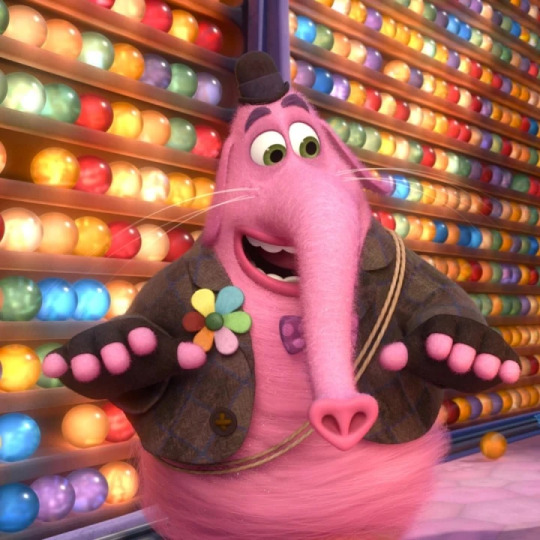
In Inside Out, Bing Bong dies, giving his life to save Joy. And by extension, to save Riley. Symbolically, Bing Bong's death represented a popular view of imaginary friends needing to die so the host child can prosper.
And that view, despite permeating pop culture, isn't really based on anything but ableism and sanism. A centuries-old myth that imaginary friends are unhealthy without an ounce of data to actually back it up.
Studies actually tend to show children with imaginary friends to be pretty healthy. And the same goes for studies of adult tulpa systems who report mental health improvements due to their tulpas.
Bing Bong shouldn't have had to die, and I would argue that his death leaves Riley worse off than if he had survived or was brought back.
IF serves as a repudiation of Inside Out's stigmatization of imaginary friends, and it's portrayal of their death being necessary to growing up.
It did this by asking a simple question… what if?
What if how we've all been taught to think of imaginary friends is wrong?
What if more people wanted to reconnect with their old imaginary friends?
What would the world look like?
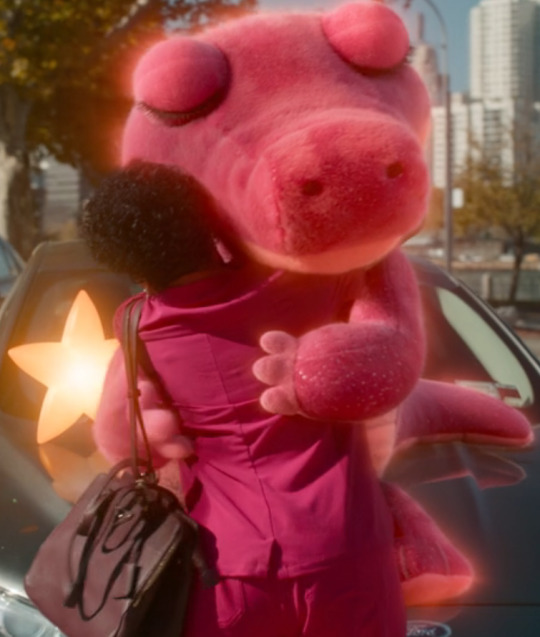
Like I said, my favorite interpretation is the spiritual one. Because then the movie ends by showing all these IFs get to reconnect with their hosts, and it's such a beautiful thing to see.
Even if I think the ending is a lie, I don't think the message is.
And it's a message that makes me, as a former imaginary friend myself, ask that same central question.
What if this movie could help lead to people re-valuating their own beliefs of imaginary friends and wanting to connect with their own from the past? How cool would that be?
If anyone out there is thinking back on their childhood imaginary friends and want to try to reconnect, my advice is to just do it. Because as the poster on the billboard says, I don't think imaginary friends ever truly disappear. They're somewhere inside as long as their memory remains.
For anyone out there who has imaginary friends right now that they think might be sentient like the ones in IF, you can check out my guide on how to know if your imaginary friend is sentient below:
And for anyone who never had a sentient IF of their own but wants one now, here is a huge collection of tulpamancy guides to get you started.
And as always, thank you all for reading! 💖
For more discussions about plurality in media, check out the Plurality of... Avatar The Last Airbender.
87 notes
·
View notes